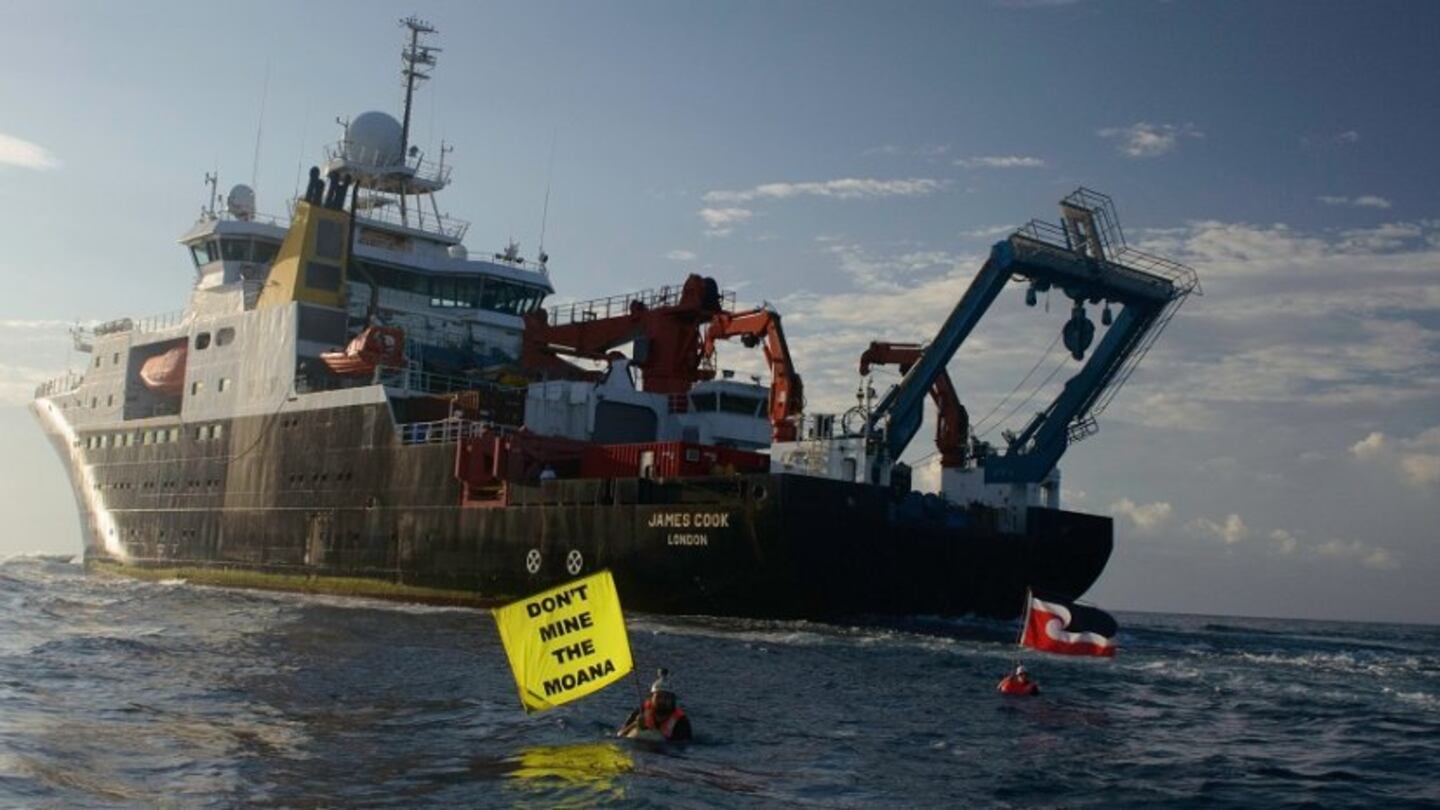Greenpeace activists waving the Tino Rangatiratanga flag confront the James Cook near Costa Rica. photo/Martin Katz Greenpeace
Māori anti-seabed mining activists have been involved in a mid-sea altercation with a research ship off the Costa Rican coast.
Greenpeace activist James Hita (Ngāti Whātua, Te Uri o Hau), and Māori issues campaigner Quack Pirihi (Ngāpuhi, Ngāti Wai, Ngāti Porou, Ngāti Whātua) were aboard the Greenpeace ship Arctic Sunrise that intercepted the research vessel James Cook as it returned to port from a seven-week expedition in the Pacific Ocean targeting deep-sea mining locations.
The pair were in rigid-hull inflatable boats (RHIBs) awaiting the James Cook. Pirihi, who says Greenpeace invited them to join its protest, carried a Tino Rangatiratanga flag and together with Hita also flew a "Don't mine the Moana" flag.
Hita said "for too long, Pacific peoples have been excluded from decisions that impact our territories and waters. If governments don't stop this industry from starting, a new cycle of colonial exploitation will begin. We reject a future with deep-sea mining."
"As if sending a ship to enable further destruction of our ecosystems wasn’t offensive enough, sending one named after the most notorious coloniser of the Pacific is a cruel insult."
Does the seabed recover?
"The opportunity to confront this ship with my authentic Māori self was incredible. We sent a very clear message to the ship and to the industry, that we will always be here and we will show up to protect the ocean."
The James Cook has been conducting research as part of the SMARTEX (Seabed Mining and Resilience to EXperimental Impact) Project in the Clarion Clipperton Zone in the central Pacific Ocean since the beginning of February. The mission, according to the project's website, has four key aims including reexamining an area that was previously tested for seabed mining in 1979 to see how it has recovered in the subsequent 44 years and visiting a Preservations Reference Area site first sampled in 1989.
Parts of the research area have been at depths of more than 5000m - referred to as 'abyssal depths', where a vast mineral resource that can be used in the development of new 'sustainable' technologies may be found.
"Abyssal plains are one of the least explored and understood regions of our planet. Measuring the baseline conditions and the changes resulting from mining will help build our understanding of this region and inform important societal decisions being made about the sustainable use of our planet’s resources," a blog post on the website said.
Seabed mining discussed
Delegates from global governments are currently gathered at the International Seabed Authority (ISA) in Kingston, Jamaica, to debate whether or not deepsea mining gets the green light this year.
"Indigenous Māori activists flying the Tino Rangatiratanga flag and challenging a ship named after a coloniser with a heartfelt message of ‘Don’t mine the Moana’ is a significant moment. We are calling out neo-colonialism in the context of deep-sea mining. We are standing for the ocean, for Pacific peoples and for indigenous peoples, and the message is clear: Deep sea mining must not begin,” Hita says.
Pirihi said the impacts of decisions made now will have profound effects for generations to come.
"Our people are very rarely given the opportunity to speak in these forums, and by flying our Tino Rangatiratanga flag at the ISA meeting in Jamaica and here at sea, I am connecting not only myself to this kaupapa but also the mokopuna that will come long after me. This flag connects the movement for absolute sovereignty over ourselves in Aotearoa, to the movement of protecting our origin stories, and the moana.”
The conference in Jamaica is expected to finish later this week.


